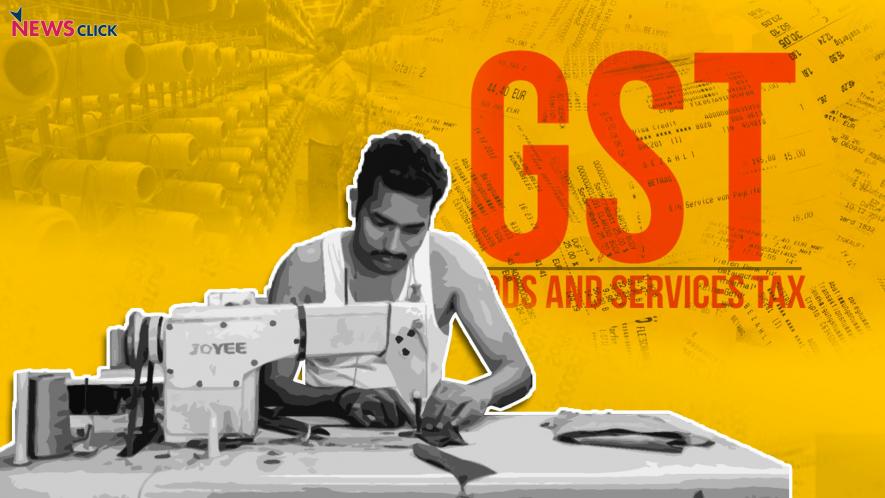Modi Tinkers With GST, But No Relief for Informal/MSME Sector

Prime Minister Modi on December 18 indicated that Goods and Services Tax (GST) will be reduced from the present 28 per cent to 18 per cent or to even less on 25-30 items including air conditioners, dishwashers and digital cameras, according to media reports. There is no official announcement, but the decision is likely to be taken in the GST Council which will meet on the coming weekend in New Delhi.
Since the GST regime was rolled out in July 2017, tax rates have been reduced on 320 items, 191 of which were in the top slab of 28 per cent. There are five tax slabs in all – with rates 0, 5, 12, 18 and 28 per cent – with luxury and so-called sin items (like yachts and private airplanes) in the top slab, and most daily-use essential items in the no-tax slab.
The fact that bulk of reductions in tax rates have taken place for the luxury items speaks for itself. These reductions are not just sops for the elite and upper middle class. They are also bonanzas for the makers of these expensive products, mostly big corporate entities.
No Mercy for Informal/MSME Sector
There is no word about changes for the vast informal sector which overlaps with the MSME sector which was devastated by GST creating recessionary conditions in this sector. Output plummeted, credit growth stagnated, bad loans mounted, and lakhs lost their jobs. The sector has still not recovered from the blow.
Overall, recognised NPA exposure for MSME is Rs.81,000 crore as on March 18 according to a TransUnion-CIBIL and SIDBI report of June 2018, and these were projected to rise by 16 per cent by March 2019. MSME exports suffered a sharp deceleration in the immediate aftermath of GST rollout, according to an RBI study (Mini Street Memo No.13).
As output declined, a recessionary condition enveloped the sector. The most damaging effect was on jobs, with lakhs of informal sector jobs lost. The MSME sector has still not recovered from this shock and a recent report by the All India Manufacturers Organisation estimates that total job losses are around 35 lakhs, in the past few years.
Although portrayed by the Modi government as a modern progressive measure that will ease the complex tax system, and make it uniform, GST was actually a potent weapon to centralise capital, pushing out the small traders and manufacturers. It has served this purpose well, and hence has been lauded by both, India’s big capitalist lobby as well as the likes of IMF and World Bank, and leaders of advanced capitalist countries – all representing the interests of global finance capital.
So, why is the government led by Modi still tinkering about with the GST regime at the top? It seems that there are twin objectives here. One is that this is a typical reaction to the losses BJP has suffered in the recent assembly elections in which the ruling BJP was ousted. Results indicate that the BJP has lost considerable ground in even the urban segments, once considered bastions of the party. The BJP seems to be thinking that reducing tax rates on consumer durables used by the upwardly mobile middle class will mollify some of these sections before the forthcoming general elections in 2019.
But, perhaps the larger factor behind this is that manufacturers’ lobbies have been pursuing the government assiduously to reduce GST on these, and similar other high-end goods. And, these are not the pesky little MSME-sector types. These are the big guys who carry much heft in political circles. The Modi government has a close – intimate – relationship with them, and has a record of fulfilling their wishes all the time, whether it be on taxation, or on bank credit, or on wages, or on labour laws, or on tax concessions.
But the most damning thing is this: there is no rethinking on GST after its all-round damaging impact on the small traders and manufacturers has been revealed in all its dimensions. The data on output, exports, jobs is there in public domain. The impact is clear from election results. Yet, the Modi government is blithely going on, using the GST tax slabs for satisfying its mentors, blind to the suffering of people.
Grabbing GST Cess Fund
In the midst of all this, there is another bit of financial chicanery in progress. At the end of the Monsoon Session of Parliament, on the last day (August 9), then Finance Minister Piyush Goyal moved a whole bunch of GST-related legislative measures that nobody paid serious attention to. In the middle of this obtuse pile of paper, there was an amendment to the GST (Compensation to States) Act.
What this amendment does is that it opens the door for the central government to take control of a huge amount of money collected in the compensation cess fund. The amended law allows the central government to take over “the unutilised (amount) in the Fund at any point of time in any financial year during the transition period”. According to one calculation, the cess collected amounts to Rs 1.28 lakh crore accumulated since the GST was introduced 16 months ago. This fund is used to compensate states for any shortfall in revenue during the transition period which is till June 30, 2022. The original law said that only after the end of the transition period, whatever amount was left would be divided up between the Centre and the states on a 50:50 basis. Through the amendment, the Centre is planning to take over the amount currently. It is estimated that about Rs.78,907 crore has been paid to states till now, leaving about Rs.49,393 crore in the kitty. Half of that is Rs.24,696 crore – which the Centre will swallow now itself.
This is yet another example of how a clueless government groping to figure out a way to revive economic activity and create jobs, is inventing ever new ways to accumulate resources by hook or by crook. Remember how it wanted RBI’s money, and how it is ‘disinvesting’ in CPSU’s driblets through buy-backs and issuing ETF’s? This GST cess fund gambit is another of those.
Meanwhile, the economy continues to stagnate, the informal sector is still moribund, and joblessness has hit a high of 8.9 per cent in November according to CMIE estimates.
Get the latest reports & analysis with people's perspective on Protests, movements & deep analytical videos, discussions of the current affairs in your Telegram app. Subscribe to NewsClick's Telegram channel & get Real-Time updates on stories, as they get published on our website.
























